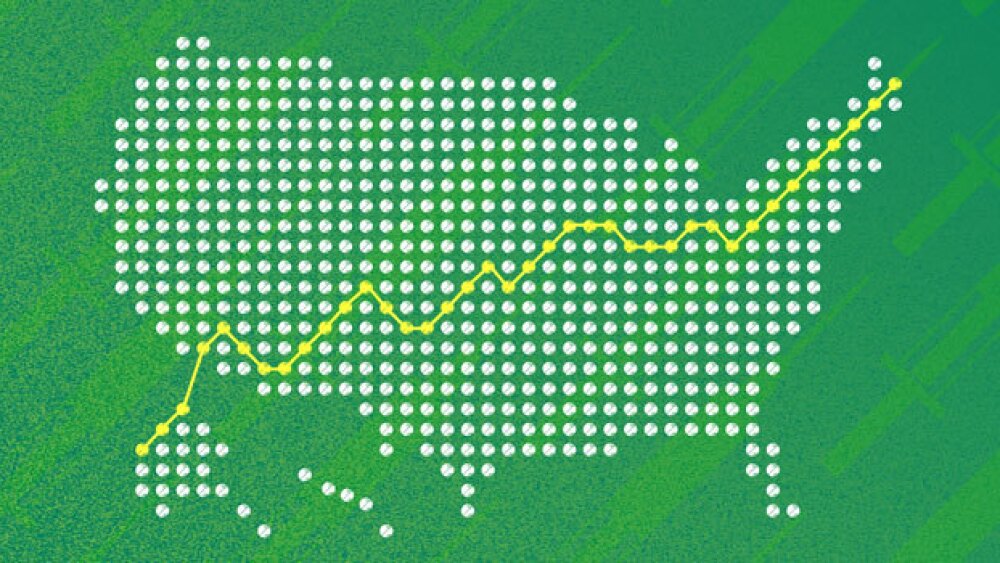The U.S. Department of Health and Human Services on Thursday released new data showing that Americans pay three times more for prescription drugs than other developed countries and nearly 10 times more for insulin.
Pictured: Concept of USA pharmaceutical market and rising costs/ Nicole Bean for BioSpace
It’s hard to remember a week more focused on the high costs of prescription drugs in the U.S. than the one we just went through. Clearly, the 2024 election season is upon us as the Biden administration this week continued its full-court press on Big Pharma, which until now has been able to set its own drug prices. As a result, Americans are paying three times more for prescription drugs than other developed countries and nearly 10 times more for insulin.
President Joe Biden made a start toward changing that situation in August 2022 when he signed the Inflation Reduction Act (IRA) into law with its provisions for the Medicare Drug Price Negotiation Program. On Thursday, the Centers for Medicare & Medicaid Services (CMS) sent its initial offers on the 10 drugs selected for price negotiations. The companies will have 30 days to accept or provide a counteroffer. “This process will lead to lower prices, putting an end to exorbitant price gouging by pharmaceutical companies,” HHS Secretary Xavier Becerra said in a statement.
In response, the Pharmaceutical Research and Manufacturers of America (PhRMA) argued that the initial offer was a campaign tactic. “This continues to be an exercise to win political points on the campaign trail rather than do what’s in the best interest of patients,” PhRMA Senior Vice President of Public Affairs Alex Schriver said in a statement on Thursday. The lobbying group also criticized the process for its lack of transparency. “Government bureaucrats are operating behind closed doors to set medicine prices without disclosing for months how they arrived at the price or how much patient and provider input was used,” Schriver said.
It was the latest salvo in the war of words between industry and the Biden administration as PhRMA and drugmakers continue their legal challenges to the IRA. The first hearing on a potential injunction came the day before CMS sent its opening maximum fair price proposals. However, a federal judge in Delaware on Wednesday appeared skeptical of the arguments raised by plaintiff AstraZeneca in what promises to be a protracted series of court battles.
Not surprisingly, analysts expect CMS to ask for steep price cuts in its initial proposals to companies. However, new research out this week shows that the IRA’s Drug Price Negotiation Program will have a modest impact on global biopharma revenues and is unlikely to cause significant cuts to research and development.
Also this week, CMS announced that it will negotiate outcomes-based agreements with manufacturers of sickle cell disease gene therapies to expand patient access to these multimillion-dollar treatments. Vertex Pharmaceuticals and CRISPR Therapeutics’ Casgevy has a list price of $2.2 million, while bluebird bio’s Lyfgenia has a wholesale acquisition cost of $3.1 million.
The pricing spotlight has also shined on GLP-1 drugs, which are typically priced around $1,000 per patient per month. Explosive demand for GLP-1 drugs Ozempic and Wegovy helped Novo Nordisk on Wednesday beat analyst expectations for its full-year 2023 sales and lifted the company’s market value past $500 billion. Novo, which is among the drugmakers suing the Biden administration to put the kibosh on the Medicare drug price negotiations, could see its overall sales grow as much as 26% this year. BioSpace reported this week that stringent regulation, manufacturing costs and the absence of price control contribute to high GLP-1 drug costs in the U.S.
Next week, the CEOs of Bristol Myers Squibb, Johnson & Johnson and Merck will be on the hot seat when Sen. Bernie Sanders (I-Vt.), chair of the Senate health committee, intends to grill them about the high prices of their drugs. It took the threat of being subpoenaed for J&J’s Joaquin Duato and Merck’s Robert Davis to agree to testify before the committee. The hearing is set for Feb. 8.
According to Sanders, the pharma industry made $110 billion in profits last year, and, due to their greed, Americans are paying the world’s highest prices for prescription drugs. As he points out, the outrageous cost of drugs in the U.S. is not just a Democratic issue but also a Republican and independent issue that requires change. Hopefully, despite this contentious election year, politicians across the divide will come together to support much-needed drug pricing reforms.
Greg Slabodkin is the News Editor at BioSpace. You can reach him at greg.slabodkin@biospace.com. Follow him on LinkedIn.






